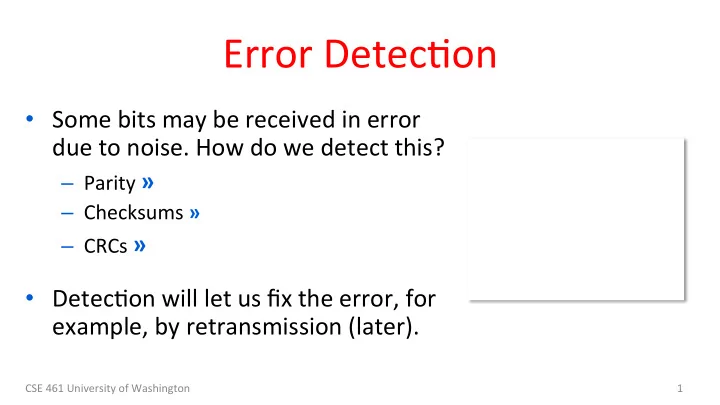

Error ¡Detec9on ¡ • Some ¡bits ¡may ¡be ¡received ¡in ¡error ¡ due ¡to ¡noise. ¡How ¡do ¡we ¡detect ¡this? ¡ – Parity ¡ » ¡ – Checksums ¡ » ¡ – CRCs ¡ » ¡ • Detec9on ¡will ¡let ¡us ¡fix ¡the ¡error, ¡for ¡ example, ¡by ¡retransmission ¡(later). ¡ CSE ¡461 ¡University ¡of ¡Washington ¡ 1 ¡
Simple ¡Error ¡Detec9on ¡– ¡Parity ¡Bit ¡ • Take ¡D ¡data ¡bits, ¡add ¡1 ¡check ¡bit ¡ that ¡is ¡the ¡sum ¡of ¡the ¡D ¡bits ¡ – Sum ¡is ¡modulo ¡2 ¡or ¡XOR ¡ CSE ¡461 ¡University ¡of ¡Washington ¡ 2 ¡
Parity ¡Bit ¡(2) ¡ • How ¡well ¡does ¡parity ¡work? ¡ – What ¡is ¡the ¡distance ¡of ¡the ¡code? ¡ ¡ ¡ – How ¡many ¡errors ¡will ¡it ¡detect/ correct? ¡ ¡ ¡ • What ¡about ¡larger ¡errors? ¡ ¡ ¡ CSE ¡461 ¡University ¡of ¡Washington ¡ 3 ¡
Checksums ¡ • Idea: ¡sum ¡up ¡data ¡in ¡N-‑bit ¡words ¡ – Widely ¡used ¡in, ¡e.g., ¡TCP/IP/UDP ¡ 1500 ¡bytes ¡ 16 ¡bits ¡ • Stronger ¡protec9on ¡than ¡parity ¡ CSE ¡461 ¡University ¡of ¡Washington ¡ 4 ¡
Internet ¡Checksum ¡ • Sum ¡is ¡defined ¡in ¡1s ¡complement ¡ arithme9c ¡(must ¡add ¡back ¡carries) ¡ – And ¡it’s ¡the ¡nega9ve ¡sum ¡ • “ The ¡checksum ¡field ¡is ¡the ¡16 ¡bit ¡one's ¡ complement ¡of ¡the ¡one's ¡complement ¡ sum ¡of ¡all ¡16 ¡bit ¡words ¡… ” ¡– ¡RFC ¡791 ¡ CSE ¡461 ¡University ¡of ¡Washington ¡ 5 ¡
Internet ¡Checksum ¡(2) ¡ Sending : ¡ 0001 f203 1. Arrange ¡data ¡in ¡16-‑bit ¡words ¡ f4f5 f6f7 2. Put ¡zero ¡in ¡checksum ¡posi9on, ¡add ¡ +(0000) ------ ¡ 2ddf0 3. Add ¡any ¡carryover ¡back ¡to ¡get ¡16 ¡bits ¡ ddf0 + 2 ------ 4. Negate ¡(complement) ¡to ¡get ¡sum ¡ ddf2 220d CSE ¡461 ¡University ¡of ¡Washington ¡ 6 ¡
Internet ¡Checksum ¡(3) ¡ Sending : ¡ 0001 f203 1. Arrange ¡data ¡in ¡16-‑bit ¡words ¡ f4f5 f6f7 +(0000) 2. Put ¡zero ¡in ¡checksum ¡posi9on, ¡add ¡ ------ 2ddf0 ddf0 3. Add ¡any ¡carryover ¡back ¡to ¡get ¡16 ¡bits ¡ + 2 ------ ddf2 4. Negate ¡(complement) ¡to ¡get ¡sum ¡ 220d CSE ¡461 ¡University ¡of ¡Washington ¡ 7 ¡
Internet ¡Checksum ¡(4) ¡ Receiving : ¡ 0001 f203 1. Arrange ¡data ¡in ¡16-‑bit ¡words ¡ f4f5 f6f7 + 220d 2. Checksum ¡will ¡be ¡non-‑zero, ¡add ¡ ------ 2fffd fffd 3. Add ¡any ¡carryover ¡back ¡to ¡get ¡16 ¡bits ¡ + 2 ------ ffff 4. Negate ¡the ¡result ¡and ¡check ¡it ¡is ¡0 ¡ 0000 CSE ¡461 ¡University ¡of ¡Washington ¡ 8 ¡
Internet ¡Checksum ¡(5) ¡ Receiving : ¡ 0001 f203 1. Arrange ¡data ¡in ¡16-‑bit ¡words ¡ f4f5 f6f7 + 220d 2. Checksum ¡will ¡be ¡non-‑zero, ¡add ¡ ------ 2fffd fffd 3. Add ¡any ¡carryover ¡back ¡to ¡get ¡16 ¡bits ¡ + 2 ------ ffff 4. Negate ¡the ¡result ¡and ¡check ¡it ¡is ¡0 ¡ 0000 CSE ¡461 ¡University ¡of ¡Washington ¡ 9 ¡
Internet ¡Checksum ¡(6) ¡ • How ¡well ¡does ¡the ¡checksum ¡work? ¡ – What ¡is ¡the ¡distance ¡of ¡the ¡code? ¡ – How ¡many ¡errors ¡will ¡it ¡detect/ correct? ¡ ¡ ¡ • What ¡about ¡larger ¡errors? ¡ ¡ ¡ CSE ¡461 ¡University ¡of ¡Washington ¡ 10 ¡
Cyclic ¡Redundancy ¡Check ¡(CRC) ¡ • Even ¡stronger ¡protec9on ¡ – Given ¡n ¡data ¡bits, ¡generate ¡k ¡check ¡ bits ¡such ¡that ¡the ¡n+k ¡bits ¡are ¡evenly ¡ divisible ¡by ¡a ¡generator ¡C ¡ ¡ • Example ¡with ¡numbers: ¡ – n ¡= ¡302, ¡k ¡= ¡one ¡digit, ¡C ¡= ¡3 ¡ CSE ¡461 ¡University ¡of ¡Washington ¡ 11 ¡
CRCs ¡(2) ¡ • The ¡catch: ¡ – It’s ¡based ¡on ¡mathema9cs ¡of ¡finite ¡ fields, ¡in ¡which ¡“numbers” ¡ represent ¡polynomials ¡ – e.g, ¡10011010 ¡is ¡x 7 ¡+ ¡x 4 ¡+ ¡x 3 ¡+ ¡x 1 ¡ ¡ • What ¡this ¡means: ¡ – We ¡work ¡with ¡binary ¡values ¡and ¡ operate ¡using ¡modulo ¡2 ¡arithme9c ¡ CSE ¡461 ¡University ¡of ¡Washington ¡ 12 ¡
CRCs ¡(3) ¡ • Send ¡Procedure: ¡ 1. Extend ¡the ¡n ¡data ¡bits ¡with ¡k ¡zeros ¡ 2. Divide ¡by ¡the ¡generator ¡value ¡C ¡ 3. Keep ¡remainder, ¡ignore ¡quo9ent ¡ 4. Adjust ¡k ¡check ¡bits ¡by ¡remainder ¡ • Receive ¡Procedure: ¡ 1. Divide ¡and ¡check ¡for ¡zero ¡remainder ¡ CSE ¡461 ¡University ¡of ¡Washington ¡ 13 ¡
CRCs ¡(4) ¡ Data ¡bits: ¡ 1 ¡0 ¡0 ¡1 ¡1 ¡1 ¡ ¡1 ¡ ¡0 ¡ ¡1 ¡ ¡0 ¡ ¡1 ¡ ¡1 ¡ ¡1 ¡ ¡1 ¡ ¡1 ¡ ¡ 1101011111 ¡ ¡ Check ¡bits: ¡ C(x)=x 4 +x 1 +1 ¡ C ¡= ¡10011 ¡ k ¡= ¡4 ¡ ¡ ¡ CSE ¡461 ¡University ¡of ¡Washington ¡ 14 ¡
CRCs ¡(5) ¡ CSE ¡461 ¡University ¡of ¡Washington ¡ 15 ¡
CRCs ¡(6) ¡ • Protec9on ¡depend ¡on ¡generator ¡ – Standard ¡CRC-‑32 ¡is ¡10000010 ¡ 01100000 ¡10001110 ¡110110111 ¡ ¡ ¡ • Proper9es: ¡ – HD=4, ¡detects ¡up ¡to ¡triple ¡bit ¡errors ¡ – Also ¡odd ¡number ¡of ¡errors ¡ ¡ – And ¡bursts ¡of ¡up ¡to ¡k ¡bits ¡in ¡error ¡ CSE ¡461 ¡University ¡of ¡Washington ¡ 16 ¡
Error ¡Detec9on ¡in ¡Prac9ce ¡ • CRCs ¡are ¡widely ¡used ¡on ¡links ¡ – Ethernet, ¡802.11, ¡ADSL, ¡Cable ¡… ¡ • Checksum ¡used ¡in ¡Internet ¡ ¡ – IP, ¡TCP, ¡UDP ¡… ¡but ¡it ¡is ¡weak ¡ • Parity ¡ – Is ¡likle ¡used ¡ CSE ¡461 ¡University ¡of ¡Washington ¡ 17 ¡
Recommend
More recommend